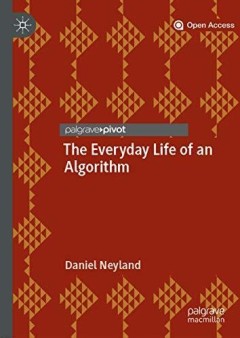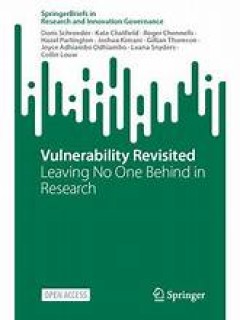Filter by

Waqf in Zaydī Yemen; Legal Theory, Codification, and Local Practice
Islamic foundations ( waqf, pl. awqāf) have been an integral part of Yemeni society both for managing private wealth and as a legal frame for charity and public infrastructure. This book focuses on four socially grounded fields of legal knowledge: fiqh, codification, individual waqf cases, and everyday waqf-related knowledge. It combines textual analysis with ethnography and seeks to understan…
- Edition
- Volume: 46
- ISBN/ISSN
- 978-90-04-37784-4
- Collation
- -
- Series Title
- -
- Call Number
- -

The Everyday Life of an Algorithm
This open access book begins with an algorithm–a set of IF…THEN rules used in the development of a new, ethical, video surveillance architecture for transport hubs. Readers are invited to follow the algorithm over three years, charting its everyday life. Questions of ethics, transparency, accountability and market value must be grasped by the algorithm in a series of ever more demanding for…
- Edition
- 1
- ISBN/ISSN
- 9783030005788
- Collation
- IX, 151 hlm; ill., lamp.,
- Series Title
- -
- Call Number
- -

The Golden and Ghoulish Age of the Gibbet in Britain
This book is open access under a CC BY 4.0 licence. This book is the first academic study of the post-mortem practice of gibbeting (‘hanging in chains’), since the nineteenth century. Gibbeting involved placing the executed body of a malefactor in an iron cage and suspending it from a tall post. A body might remain in the gibbet for many decades, while it gradually fell to pieces. H…
- Edition
- 1
- ISBN/ISSN
- 978-1-137-60089-9
- Collation
- -
- Series Title
- Palgrave Historical Studies in the Criminal Corpse and its Afterlife
- Call Number
- -

Child Protection in England, 1960–2000
This book is open access under a CC BY 4.0 license. This open access book explores how children, parents, and survivors reshaped the politics of child protection in late twentieth-century England. Activism by these groups, often manifested in small voluntary organisations, drew upon and constructed an expertise grounded in experience and emotion that supported, challenged, and subverted…
- Edition
- 1
- ISBN/ISSN
- 978-3-319-94718-1
- Collation
- -
- Series Title
- Palgrave Studies in the History of Childhood
- Call Number
- IX, 215

Ethics of Artificial Intelligence
This open access collection of AI ethics case studies is the first book to present real-life case studies combined with commentaries and strategies for overcoming ethical challenges. Case studies are one of the best ways to learn about ethical dilemmas and to achieve insights into various complexities and stakeholder perspectives. Given the omnipresence of AI ethics in academic, policy and medi…
- Edition
- 1
- ISBN/ISSN
- 978-3-031-17040-9
- Collation
- -
- Series Title
- SpringerBriefs in Research and Innovation Governance
- Call Number
- XII, 116

New Horizons for a Data-Driven Economy
In this book readers will find technological discussions on the existing and emerging technologies across the different stages of the big data value chain. They will learn about legal aspects of big data, the social impact, and about education needs and requirements. And they will discover the business perspective and how big data technology can be exploited to deliver value within different se…
- Edition
- 1
- ISBN/ISSN
- 978-3-319-21569-3
- Collation
- -
- Series Title
- XX, 303
- Call Number
- -

Cyber security politics :socio-technological transformations and political fr…
- Edition
- -
- ISBN/ISSN
- 9781003110224
- Collation
- -
- Series Title
- -
- Call Number
- -
- Edition
- -
- ISBN/ISSN
- 9781003110224
- Collation
- -
- Series Title
- -
- Call Number
- -

Resourceful Civil Society
This open access book examines how civil society organizations in Poland, Russia, and Sweden (re)act to transformations of opportunities and limitations in access to various forms of resources. The volume’s contributions discuss the constraints associated with different types of resources as well as organizations’ capacities to generate resources—or compensate for their lack—as they neg…
- Edition
- -
- ISBN/ISSN
- 978-3-030-99007-7
- Collation
- -
- Series Title
- -
- Call Number
- -

From Digital Twins to Digital Selves and Beyond
This open access book aims at deepening the understanding of the relation between cyber-physical systems (CPSs) as socio-technical systems and their digital representations with intertwined artificial intelligence (AI). The authors describe why it is crucial for digital selves to be able to develop emotional behavior and why a humanity-inspired AI is necessary so that humans and humanoids can c…
- Edition
- 1
- ISBN/ISSN
- -
- Collation
- -
- Series Title
- -
- Call Number
- XVIII, 127

Ethics of Artificial Intelligence: Case Studies and Options for Addressing Et…
This open access collection of AI ethics case studies is the first book to present real-life case studies combined with commentaries and strategies for overcoming ethical challenges. Case studies are one of the best ways to learn about ethical dilemmas and to achieve insights into various complexities and stakeholder perspectives. Given the omnipresence of AI ethics in academic, policy and medi…
- Edition
- 1
- ISBN/ISSN
- 978-3-031-17040-9
- Collation
- -
- Series Title
- SpringerBriefs in Research and Innovation Governance
- Call Number
- XII, 116
 Computer Science, Information & General Works
Computer Science, Information & General Works  Philosophy & Psychology
Philosophy & Psychology  Religion
Religion  Social Sciences
Social Sciences  Language
Language  Pure Science
Pure Science  Applied Sciences
Applied Sciences  Art & Recreation
Art & Recreation  Literature
Literature  History & Geography
History & Geography